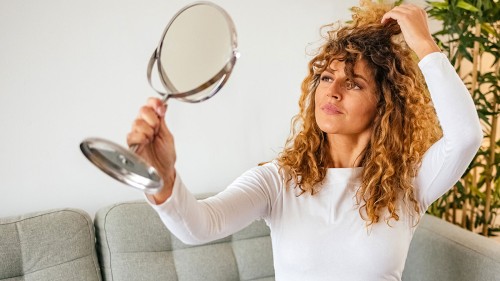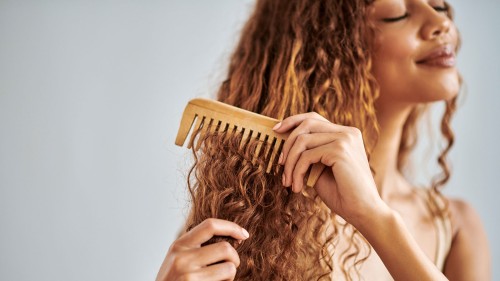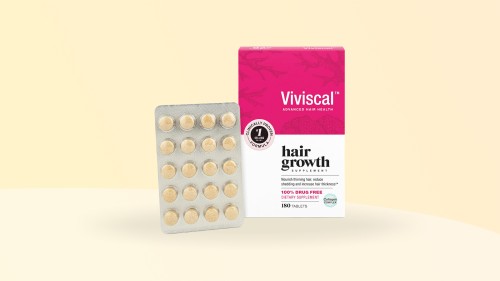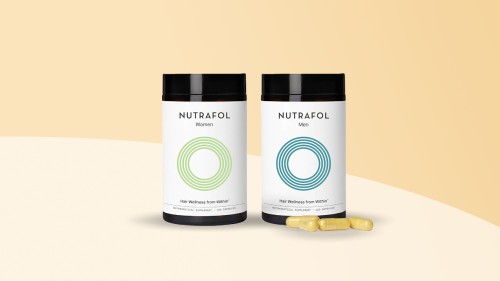Best (and Tasty) Foods for Hair Growth and Easy Ways to Add Them to Your Diet
Published on March 14, 2022
Medically Reviewed by Natalie Olsen, MS, RDN
While some things out of your control — such as age, gender, and genes — affect how quickly your hair grows, simple changes to your diet may help you get stronger, healthier hair. Learn about the best foods to encourage faster growth by supporting your body from the inside out.


While every person is unique, the average rate for hair growth is about six inches per year.
Multiple factors influence the speed of hair growth.
These include:
-
Genetics: Your genes will dictate how quickly your hair grows.
-
Gender: Research indicates male hair grows faster than female hair.
-
Age: Hair grows quickest between the ages of 15–30 years of age. On average, hair growth slows after 30, and some follicles stop growth altogether. (1)
-
Hormone fluctuations: A shift in hormones may prompt the hair roots to enter the resting stage of the hair cycle too early, causing rapid hair loss. (2)
-
Nutritional status: Quality nutrition is essential for healthy hair growth. For instance, inadequate protein intake may lead to brittle, thinning hair. (1)
Follicle cells require vitamins and minerals to grow; therefore, good nutrition is vital for healthy hair growth. The follicle is the living part of the hair root, and it receives its nutrients from the blood.
Eating a healthy diet filled with vegetables, fruits, essential protein, healthy fats, and low processed carbohydrates is necessary for hair growth.
Here is a list of the best foods for healthy hair.
1. Eggs
Eggs are affordable, easy to cook, and have an incredible nutrient profile for healthy hair growth.
For starters, one egg boasts 6 grams of protein and a healthy dose of biotin. Both protein and biotin are essential nutrients for hair growth.
Biotin is a B vitamin, and while it is involved in many metabolic processes in the body, it is widely known for its relationship to hair growth. (3)
While studies are inconclusive on the benefit of biotin supplements alone, research shows that this B vitamin plays an essential role in keratin production. (3)
Keratin is the protein that makes hair, and supporting it with biotin-rich foods will help prevent brittle hair and hair loss.
In addition to biotin, eggs have vitamins A, E, and folate, all nutrients that support the growth of thick, healthy hair.
Finally, the yolk is packed with healthy fats, essential in keeping locks sleek and shiny.
Put It Into Action
- Eggs make a fantastic, high-protein breakfast. Enjoy them scrambled, over easy, or boiled for on the go.
- Whisk eggs with a banana for an easy two-ingredient breakfast.
- Make an omelet with added veggies for a double boost of healthy hair foods.
- Bake eggs in a hollowed-out sweet potato for a filling dinner or lunch.
2. Fatty Fish
Fish, like salmon, is a perfect food for hair growth — it contains essential omega-3 fatty acids and protein.
One study linked six months of omega-3 supplementation with increased hair growth in women. (4)
Additionally, research has shown that omega-3s may reduce inflammation, which can be especially helpful in cases like seborrheic dermatitis, folliculitis, and psoriasis — conditions that may irritate the scalp, leading to hair loss. (5)
Finally, according to the American Academy of Dermatology, a healthy diet with essential fats is essential for locking in moisture and helping your hair look fuller and thicker. (5)
Put It Into Action
- Enjoy baked, grilled, or roasted salmon two times a week.
- Try other fish like sardines, mackerel, cod, or tuna.
- Increase your omega-3 uptake by cooking your fish in olive oil, avocado oil, or flaxseed oil.
Related: Foods That Are Very High in Omega-3
3. Spinach and Other Leafy Greens
These small leafy greens provide a long list of nutrients that may help to boost hair growth.
Other goods choices are:
- Kale
- Collard greens
- Microgreens
- Swiss chard
These greens are rich in antioxidants such as selenium, lutein, vitamin C, and vitamin A.
Antioxidants are vital in protecting the body against damage from substances called free radicals. Free radicals are unstable atoms in the body that may cause harm if not kept in check.
In the case of hair health, free radicals may cause damage to the hair follicle, leading to hair loss and baldness. (5)
Research shows that inadequate iron levels may lead to increased hair loss and shedding, imitating genetic male or female pattern baldness. (5)
Unlike genetic pattern baldness, hair should grow back once iron levels are restored to optimal levels. (5)
Put It Into Action
- Cook spinach with scrambled eggs for a healthy breakfast.
- Add spinach or other leafy greens to smoothies for an extra boost.
- Make a wrap with collard greens.
- Save beet and turnip tops and use them for juice or smoothies.
- Add a leafy green salad to lunch and dinners.
Related: Healthiest Leafy Green Vegetables and How to Use Them More Often
4. Fruits High in Vitamin C
Acerola cherries are an abundant source of vitamin C — just one cup contains almost 100 times more vitamin C than an orange. (6)
Vitamin C is critical in helping your body absorb iron and make collagen. Collagen is one of the proteins necessary for hair growth. (6)
Humans better absorb vitamin C through whole foods versus supplementation; therefore, a diet rich in cherries, tomatoes, bell peppers, and citrus fruits is an essential part of healthy hair growth.
Put It Into Action
- Snack on cherries, tomatoes, citrus fruits, or bell peppers.
- Pair your protein with citrus food to increase iron absorption.
5. Nuts and Seeds
Nuts and seeds are nutrient-dense foods that are a great addition to your diet in preventing hair loss and damage.
These foods are small but mighty, serving as a great source of vitamin E, zinc, selenium, omega-3 fatty acids, and even some protein.
If you're looking to enhance your hair health, some of the best choices are:
- Almonds
- Walnuts
- Chia seeds
- Flaxseeds
- Brazil nuts
- Pumpkin seeds
The most notable nutrients in nuts and seeds for hair health are zinc and selenium. Your body cannot make these essential elements, so you must get them through your diet.
In a 2019 review, researchers determined that zinc helps keep the oil glands around the follicle functioning properly. (5)
Studies further illustrate that hair loss is a common side effect of zinc deficiency. Still, adequate dietary intake may reverse deficiency-related hair loss. (5)
Finally, research reports that newly developed hair follicles take up selenium from the blood. A sufficient intake of this mineral may promote thick, healthy hair growth. (5)
On the flip side, too much zinc and selenium may contribute to undesirable hair loss and breakage. Hence, it is best to get these minerals from whole foods.
Put It Into Action
- Snack on almonds, walnuts, or brazil nuts to keep hunger at bay between meals.
- Toss pumpkin seeds into a salad or sprinkle in a sandwich or wrap.
- Add chia or flaxseed to smoothies or baked goods for an extra boost.
6. Sweet Potatoes
Sweet potatoes are not only an easy and delicious side to your meal, but they are an incredible source of beta carotene.
Beta carotene creates the orange pigment seen in sweet potatoes and other foods like carrots, cantaloupe, and butternut squash.
Once in the body, beta carotene is converted into vitamin A.
Our cells require sufficient vitamin A to grow and replicate, including the skin cells that form hair follicles. [source]
Additionally, vitamin A plays a critical role in the production of sebum — an oil substance that keeps your scalp moisturized and healthy. An adequate amount of sebum is essential for preventing dry, brittle hair. (5)
Put It Into Action
- Swap white potatoes for sweet potatoes and enjoy them roasted, baked, or mashed.
- Grill them — slice them thinly and grill until lightly brown, then drizzle with lime juice.
- Top your salad — roasted sweet potatoes make a great addition to your salad.
7. Organic Dairy
Dairy products such as yogurt and milk are excellent sources of calcium, an essential mineral for healthy hair growth.
Research has found that calcium plays a significant role in the secretion of androgen hormones and biotin production. (5)
Androgen hormones tell the body to stimulate hair growth. (2)
If you tolerate dairy, enjoying it once a day may help you achieve stronger, healthier hair.
If you do not tolerate dairy, you can get calcium through other foods like:
- Chia seeds
- Dried figs
- Almonds
- Broccoli
- White beans
Put It Into Action
- Add unsweetened kefir yogurt to smoothies for an added calcium and protein boost.
- Enjoy a breakfast parfait with unsweetened Greek yogurt, nuts, and fresh fruit.
- Enjoy a 1/2 cup of cottage cheese as a snack for the ultimate combo of protein and calcium.
8. Oysters
While they may not be a regular part of your diet, oysters are an incredible food for hair health due to their abundant zinc content.
As mentioned before, zinc is essential for sustaining healthy oil glands around the hair follicle. Well-hydrated follicles are necessary for keeping hair from getting dry and damaged.
Additionally, zinc works alongside calcium in stimulating the secretion of androgen hormones, the hormones responsible for signaling hair growth. (5)
If you aren't a fan of oysters, other excellent sources of zinc include:
- Beef
- Crab
- Pork
- Spinach
- Lentils
Put It Into Action
- Enjoy smoked, raw, or cooked oysters to get the most zinc.
- Mix up your protein — eating a variety of beef, lentils, and seafood, like oysters and crab, will help ensure adequate zinc intake.
Related: Foods High in Zinc
Frequently Asked Questions
Can hair loss be reversed?
This is dependent on the reason for hair loss; however, with appropriate treatment and diet modifications, it may be possible to regrow your hair or slow the hair loss.
Do biotin supplements work for hair growth?
While biotin is a popular supplement for hair, skin, and nail health, studies are inconclusive on whether supplementation leads to hair growth.
Additionally, the FDA does not regulate supplements, making it difficult to know what you are getting in. It is best to increase your biotin intake through your diet.
Do expensive shampoos and hair treatment help hair grow thicker?
Most over-the-counter hair products will not lead to substantial hair growth unless specifically prescribed by a physician. However, they may help your strands lock in moisture, leading to shinier, fuller-looking hair.
Should I take vitamins to help my hair grow thicker and longer?
While supplements may help you fill the gap of nutrient deficiencies, it is always best to make changes to your diet first.
The Bottom Line
Multiple factors such as genetics, gender, age, nutritional status, and hormone fluctuations affect your hair health.
While some of these may be out of your control, eating a healthy and varied diet is something you can do to help promote healthy hair growth.
Some powerful foods that stimulate hair growth include:
- Eggs: Great for any meal, eggs offer a perfect dose of protein, B vitamins, and Omega-3s for healthy hair growth.
- Fatty fish: Fish like salmon, mackerel, and sardines are packed with omega-3 fatty acids, linked to increased hair growth and shinier locks.
- Spinach: Leafy greens like spinach are rich in antioxidants that may protect your hair against damage.
- Cherries: Foods rich in vitamin C, like cherries, play an essential role in collagen production, a necessary protein for hair growth.
- Nuts and seeds: Both nuts and seeds serve up a healthy dose of selenium, an essential nutrient for keeping your hair follicles healthy.
- Sweet potatoes: Orange foods like sweet potatoes, carrots, and butternut squash promote healthy hair growth by supporting the production of natural oils.
- Organic dairy: Calcium found in dairy products like yogurt, milk, or cheese, may help the production of the hormone that stimulates hair growth.
- Oysters: Oysters are an excellent food for hair growth with abundant zinc. If oysters aren't your taste, other sources of zinc include lentils and beef.
Focusing on your intake to include a healthy variety of foods is vital for promoting healthy hair growth.
At WellnessVerge, we only use reputable sources, including peer-reviewed medical journals and well-respected academic institutions.
- Thieme E-Journals - Seminars in Reproductive Endocrinology / Abstract:
https://www.thieme-connect.com/products/ejournals/abstract/10.1055/s-2007-1022494 - Hormonal Effects on Hair Follicles:
https://www.ncbi.nlm.nih.gov/pmc/articles/PMC7432488/ - A Review of the Use of Biotin for Hair Loss:
https://www.ncbi.nlm.nih.gov/pmc/articles/PMC5582478/ - Effect of a nutritional supplement on hair loss in women - PubMed:
https://pubmed.ncbi.nlm.nih.gov/25573272/ - The Role of Vitamins and Minerals in Hair Loss: A Review:
https://www.ncbi.nlm.nih.gov/pmc/articles/PMC6380979/ - Acerola, an untapped functional superfruit: a review on latest frontiers:
https://www.ncbi.nlm.nih.gov/pmc/articles/PMC6098779/






